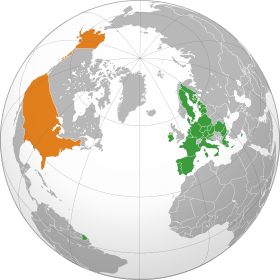 The United States (orange) and the European Union (green) | |
| Type | Trade agreement |
|---|---|
| Signed | No |
| Sealed | Obsolete |
The Transatlantic Trade and Investment Partnership (TTIP) was a proposed trade agreement between the European Union (EU) and the United States, with the aim of promoting trade and multilateral economic growth. According to Karel de Gucht, European Commissioner for Trade between 2010 and 2014, the TTIP would have been the largest bilateral trade initiative ever negotiated, not only because it would have involved the two largest economic areas in the world but also "because of its potential global reach in setting an example for future partners and agreements".[1]
Negotiations were halted by United States president Donald Trump,[2] who then initiated a trade conflict with the EU. Trump and the EU declared a truce of sorts in July 2018, resuming talks that appeared similar to TTIP.[3] On 15 April 2019, the negotiations were declared "obsolete and no longer relevant" by the European Commission.[4]
The European Commission claimed that the TTIP would have boosted the EU's economy by €120 billion, the US economy by €90 billion and the rest of the world by €100 billion.[5] According to Anu Bradford, law professor at Columbia Law School, and Thomas J. Bollyky of the Council on Foreign Relations, TTIP aimed to "liberalise one-third of global trade" and could create millions of new jobs.[6] A Guardian article by Dean Baker of the US thinktank Center for Economic and Policy Research[7][8][9] argued that the economic benefits per household would be relatively small.[10] According to a European Parliament report, impacts on labour conditions range from job gains to job losses, depending on economic model and assumptions used for predictions.[11]
The reports on the past negotiations and the contents of the negotiated TTIP proposals are classified information, and can be accessed only by authorised persons.[12] Multiple leaks of proposed TTIP contents into the public caused controversy.[13] The proposed agreement had been criticized and opposed by some unions, charities, NGOs and environmentalists, particularly in Europe.[14][15]
The Independent describes common criticisms of TTIP as "reducing the regulatory barriers to trade for big business, things like food safety law, environmental legislation, banking regulations and the sovereign powers of individual nations",[16] or more critically as an "assault on European and US societies by transnational corporations".[16] The Guardian noted the criticism of TTIP's "undemocratic nature of the closed-door talks", "influence of powerful lobbyists", TTIP's potential ability to "undermine the democratic authority of local government",[17] and described it as "the most controversial trade deal the EU has ever negotiated".[18] German economist Max Otte argued that by putting European workers into direct competition with Americans, TTIP would negatively impact the European social models.[19] An EU direct democracy mechanism, the European Citizens' Initiative, which enables EU citizens to call directly on the European Commission to propose a legal act,[20] acquired over 3.2 million signatures against TTIP and CETA within a year.[21][22]
- ^ Karel de Gucht, Foreword in Jean-Frédéric Morin, Tereza Novotná, Frederik Ponjaert and Mario Telò, The Politics of Transatlantic Trade Negotiations, TTIP in a Globalized World, Routledge, 2015, p.xvii
- ^ Erlanger, Steven (26 July 2018). "Europe Averts a Trade War With Trump. But Can It Trust Him?". The New York Times. Retrieved 28 July 2018.
- ^ Swanson, Ana; Ewing, Jack (26 July 2018). "Trump's Trade Truce With Europe Has a Familiar Feel: It Mirrors Obama's Path". The New York Times. Retrieved 28 July 2018.
- ^ European Commission. "Negotiations and Agreements: Transatlantic Trade and Investment Partnership".
- ^ Cite error: The named reference
EU-ttipwas invoked but never defined (see the help page). - ^ Cite error: The named reference
Bollyky Foreign Affairswas invoked but never defined (see the help page). - ^ Rosenberg, Tina (4 November 2007). "The Perils of Petrocracy". The New York Times. Retrieved 5 October 2014.
… Mark Weisbrot, co-director of the Center for Economic and Policy Research, a left-leaning Washington policy group.
- ^ Sussman, Anna Louie (7 September 2015). "Are Women the New Face of Organized Labor?". The Wall Street Journal. Retrieved 20 September 2015.
- ^ Fox, Maggie (24 July 2013). "Obamacare won't slash workers' hours, report finds". NBC News. Retrieved 31 October 2014.
- ^ Cite error: The named reference
guardian July 15, 2013was invoked but never defined (see the help page). - ^ Susanne Kraatz. The Transatlantic Trade and Investment Partnership (TTIP) and Labour. European Parliament.
- ^ Cite error: The named reference
Independent 14 August 2015was invoked but never defined (see the help page). - ^ Cite error: The named reference
The Guardian May 1, 2016was invoked but never defined (see the help page). - ^ Stuart Jeffries. What is TTIP and why should we be angry about it?. The Guardian. Published on 3 August 2015.
- ^ Cite error: The named reference
The Daily Beastwas invoked but never defined (see the help page). - ^ a b Cite error: The named reference
The Independent October 6, 2015was invoked but never defined (see the help page). - ^ Tim Smedley. TTIP: what does the transatlantic trade deal mean for renewable energy?. The Guardian. 5 August 2015.
- ^ Cite error: The named reference
theguardian.com 27 August 2016was invoked but never defined (see the help page). - ^ Cite error: The named reference
heute April 8, 2016was invoked but never defined (see the help page). - ^ "Homepage – European Citizens' Initiative – European Commission".
- ^ Cite error: The named reference
guard 3 Aug 2015was invoked but never defined (see the help page). - ^ Cite error: The named reference
Stop TTIPwas invoked but never defined (see the help page).